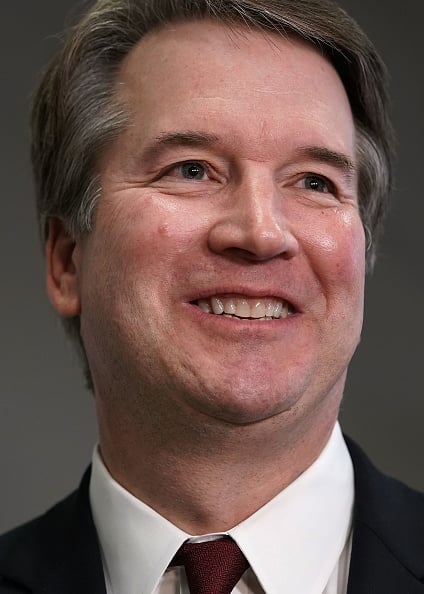You have /5 articles left.
Sign up for a free account or log in.

Brett Kavanaugh
Getty Images
By all accounts, Brett Kavanaugh has been a great law school professor: hardworking, even-handed and deeply committed to his students’ intellectual and professional growth. So would these same attributes make him a great U.S. Supreme Court justice, as well?
Not if you think the court should protect abortion rights, affirmative action and other liberal ideals. As a professor, Kavanaugh sought to help his students develop their own opinions about controversial issues in law and society. But as a lawyer and a judge, Kavanaugh has argued consistently and powerfully for his opinions on those issues.
And, lo and behold, he has almost always opined on the conservative side. That’s why President Trump nominated Kavanaugh to replace Justice Anthony Kennedy, who is stepping down. Kavanaugh wasn’t chosen for the fair-minded way he conducted his classroom but rather for single-minded way he has interpreted the law.
Don’t tell that to Kavanaugh’s handlers, who have made a big deal about his stellar teaching record. His confirmation team at the White House recently released Kavanaugh’s student evaluations for the law classes he has taught at Yale, Georgetown and Harvard Universities. It's an effort to burnish his image as the kind of guy who is open to different points of view rather than as an ideologue bent on imposing his own.
And as a professor, that’s exactly what Brett Kavanaugh was. I’m researching a book on the history of teaching at American universities, so I’ve read thousands of student evaluations -- good, bad and lots in between. But I’ve rarely encountered comments as uniformly glowing as the ones Kavanaugh received.
He was rigorous but kind. He was always prepared for class and available to meet outside it. He often took students to dinner to discuss their legal ideas as well as their professional trajectories.
And while almost everyone knew he was a conservative player, Kavanaugh didn’t seek to recruit students to his team. Instead, he elicited different points of view and gave all of them a fair hearing. “He wasn’t in class to lecture us on Judge Kavanaugh’s policy preferences,” said one of his former students at Harvard, where Kavanaugh taught for a decade. “He was there to talk about the law.”
But is any of that really relevant to how he’d perform on the Supreme Court?
As a lawyer -- and, yes, as a judge -- Kavanaugh has worked to propagate and defend his own preferences. A courtroom isn’t an intellectual salon where ideas are deliberated for their own sake. It’s a field of battle where one side typically wins.
And if you don’t think Brett Kavanaugh wants his side to win, well, you just haven’t been watching him. Over the past quarter century, Kavanaugh has been close to -- or part of -- almost every important conservative cause in the United States. As Senator Richard Durbin, a Democrat from Illinois, once quipped, Kavanaugh is the “Forrest Gump of Republican politics.”
Kavanaugh was a key aide to Special Prosecutor Kenneth W. Starr during the investigation of Bill Clinton’s affair with Monica Lewinsky, which culminated in Clinton’s impeachment. In a memo to Starr, two days before Clinton testified to a grand jury, Kavanaugh urged Starr’s interviewers to confront the president with all the salacious details that the probe had unearthed.
“The idea of going easy on him at the questioning is … abhorrent to me,” Kavanaugh told Starr. “The President has disgraced his Office, the legal system, and the American people by having sex with a 22-year-old intern.”
Kavanaugh later worked on George W. Bush’s legal team during the 2000 Florida recount, which resulted in a Supreme Court decision allowing Bush to assume the presidency. He served as associate White House counsel when the Bush administration was formulating its policies on detainees accused of terrorism, although Kavanaugh insisted at his confirmation hearing for the D.C. Circuit Court of Appeals that he wasn’t involved with the infamous memos justifying torture.
And once Kavanaugh joined the D.C. Circuit, in 2006, he became a reliable vote for nearly every conservative judicial position. He ruled in favor of the National Security Agency’s massive surveillance of phone records. He claimed that the Consumer Financial Protection Bureau is unconstitutional. And, most recently, he argued that a detained immigrant minor did not have a right to receive an abortion.
All of these positions are defensible, and Brett Kavanaugh has proved himself an able defender of them. And surely the skills and practices that Kavanaugh displayed in his law school classroom -- civility, decency and generosity -- have also helped him in deliberations with colleagues, interactions with witnesses and the other activities of a judge. And when it comes to his important judicial duty -- the rendering of legal opinions -- he has obviously been well served by his ability to explore multiple perspectives on every question, just as he did as a professor. But he has used that ability as a judge to further his perspective, over and over again.
Kavanaugh’s advocates would like you think that his legal decisions will be “free of political partisanship,” as a group of his fellow Yale Law School alumni -- joined by several current students and faculty members -- wrote in an open letter earlier this month. That echoes the myth of judicial impartiality promoted by recent Supreme Court nominees across the ideological spectrum, from Ruth Bader Ginsburg to Neil Gorsuch.
And it’s simply not true. If the justices were truly impartial, they wouldn’t align so routinely in conservative and liberal camps. Justice Kennedy was a welcome exception: although a Republican appointee, he sometimes joined the liberal side. And that’s precisely what Republicans don’t want from his replacement, which is why President Trump selected a predictable conservative like Kavanaugh.
My daughter is planning to go to law school, where I hope she encounters professors as skilled and dedicated as Brett Kavanaugh. But I also hope that he is not confirmed for the Supreme Court, where his skills would likely be dedicated to rolling back abortion rights, affirmative action and many other causes that I hold dear. He is impartial in the classroom, not in the courtroom. And there's a world of difference between the two.




